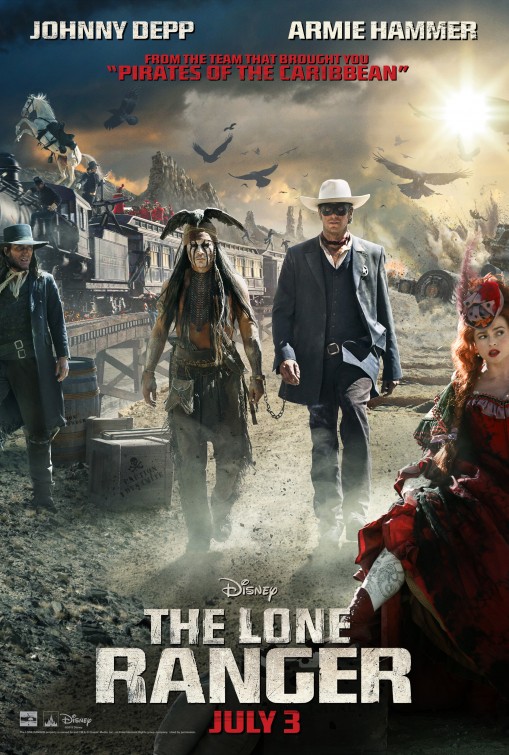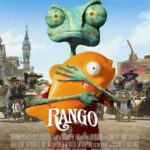Never Take Off The Mask
Director
Gore Verbinski
Starring
Armie Hammer
Johnny Depp
The film opens at a fare in 1933 San Francisco. A little boy in cowboy attire is perusing a Wild West stall and notices the wax work of an elderly Comanche is in fact alive. The wax work claims to be Tonto, mistaking the little boy for The Lone Ranger. The boy, believing the infamous characters to be fictional, queries the old man, leading to the start of the story. We are then transported to 1869 Colby, Texas, where railroad tycoon Latham Cole [Tom Wilkinson] is announcing plans for westward expansion, in accordance with the treaty with the Comanche natives. Simultaneously, a multi-purposed train is heading to Colby with young, gun-shy, idealist lawyer, John Reid [Hammer], various missionaries and two prisoners: the scarred menace Butch Cavendish [William Fichtner] and eccentric Indian, Tonto [Depp]. Before reaching their destination, Butch’s gang swipes their leader and derails the train. Miraculously, both Reid and Tonto survive. A posse is formed and Reid joins his brothers and six other rangers to track down the notorious fugitive. In the process, however, they are all shot and killed. While burying the bodies, Tonto discovers that Reid is still alive. Believing he has travelled to the other side and returned a spirit walker, he hands Reid a mask, coaxing him to pursue justice, vengeance and retribution.
The Lone Ranger is a fairly interesting foray, covering most of the big thematic elements of Westerns but ultimately a little dull. Since the 90’s, the grisly revisionist Western has seen moderate success but it’s still a very difficult genre to resurrect. The family-friendly Western adventure, on the other hand, is a fucking zombie; the first thing cinemagoers want to do is recoil and shoot it in the head. To the degree that audiences probably won’t even give this film a chance or go in with prejudices concerning the genre. But Verbinski has already proved he could bring back previously successful enterprises (Pirate films for crying out loud! Who ever thought they’d be popular again?) and even produced a brilliant and award winning Western of his own with Rango. The design of Cavendish’s gang is very much akin to the townfolk of Dirt but other than that, the similarities with Rango stop there, failing to import the memorable charm and charisma of the characters. Despite the wide anamorphic shots and Utah scenery, synonymous with John Ford flicks, the scale feels very small, both in terms of plot and execution. Again, this is in spite of the good direction, fairly impressive acting and luscious cinematography and comes down to the fact that the script simply doesn’t cut it. The whole thing was very reminiscent of the 1998/2005 Zorro films, which enjoyed a modicum of success but failed to really impress. Impress me that is.
The acting can be split into distinct thirds, in terms of quality, exploration and reception. The obvious starting point is Hammer as John Reid and Depp as Tonto. In order to launch a successful franchise (which is Disney’s ultimate goal), you need a set of spectacular leads. Unless you’re talking about the Pirates Of The Caribbean series, in which case it was the supporting roles of Depp and Geoffrey Rush that really stole the show. Hammer is fairly commendable but still not winning over the public for some reason. It’s my opinion that he was sold into the image of the young heartthrob but his real talents lie in dramas rather than comedic family roles. But the performance is far from bad, the character is simply flat. Based on the simple, altruistic moral core that the original Lone Ranger represented, it’s a hard sell but Hammer manages to convince the audience that he’s a generally good guy – even if he spends the majority of a Western unarmed. I’m saving all my thoughts on Depp until later. The second third is occupied by the two lead bad guys (*spoiler*). Fichtner has a really vicious edge to him and like the Barbosa character in POTC, genuinely feels authentic to the savagery of the West. Equally, Wilkinson brings an almost fatherly element to the first half of the film before revealing a thoroughly twisted and malicious side later, which is superbly delivered. And then there’s everyone else. The supporting cast and the extras are pretty much filed down into the same vacant space (in a two and a half hour film!), jostling for attention and meaning. So, in addition to countless nameless actors simply populating the town, Barry Pepper, Helena Bonham Carter, Ruth Wilson and James Badge Dale (all of whom are praiseworthy actors in their own right) were criminally underused, making way for more crazy Depp.
While the film leans heavily on its technical merits (smooth editing, glorious visuals, stellar costumes, hair, make-up and set design, etc), there is a staggering amount of redundancy from start to finish. While several scenes work physically well, they add nothing whatsoever to either the characters or the story. To list them would be pointless out of context but any cinemagoer could probably point to at least seven or eight scenarios that the film could have done without. More frustratingly, however, was the altogether pleasing but very unimaginative score from Hans Zimmer. Zimmer has produced some truly magnificent melodies and themes over the last few decades, striding happily into a Jerry Goldsmith level of prowess. But in doing so, the level of expectation when his name is attached to a project is incredibly high. The only chance he really gets to spread his legs (outside of rather obvious references to Ennio Morricone) is when adapting the ‘Lone Ranger theme’ (William Tell Overture). Personally, I understand the desire to infuse an iconic element such as this into a film of this nature but it felt really, really hackneyed. I assume the intention was to bring back those childlike memories of running around a garden somewhere pretending to be a cowboy or listening to the radio shows/seeing the TV programmes and instantly being transported back to a simpler time. Not the case, it just felt bloody stupid. Like having Christian Bale appear for the first time in Batman Begins, uttering the immortal words “I’m Batman!” before running off into the night to the theme of ‘dinna dinna dinna Batman!’ But in the midst of it, Zimmer manages to work a few adapted sections in, creating a fresh feeling for even a brief moment. Personally, I couldn’t care less if this film succeeds or not. It was pretty entertaining and a lot of the so called criticisms stem from a poor marketing campaign which relied on the Pirates Of The Caribbean name and aiming the movie at kids. I think I’m most irked because this movie was made instead of BioShock. At least it wasn’t 3D and was better than Pirates Of The Caribbean: On Stranger Tides, so we have that to be grateful for.
Release Date:
9th August 2013
The Scene To Look Out For:
As previously mentioned, there is a narrative framing device that jumps back and forth between old Tonto looking sad. This happens more often than one would like and while the aged make-up is very impressive, it’s absolutely unnecessary. Furthermore, you’d think this unreliable narrator element would produce something really manic and crazy but instead it just leaves the story feeling disjointed at times. The thing that really bugged me is Tonto’s appearance in the canyon where Reid is shot. The little boy openly asks, “How did you get out of jail? The wizened native doesn’t actually respond, he just carries on telling the story. No! Sorry. You can strong-arm a kid with that bullshit but not cinema audiences. How.. exactly.. did Tonto get out of prison? And more importantly, why did no one feel it necessary to show this, when they showed everything else? Not good enough, sir! Not good enough.
Notable Characters:
Tonto and his execution is quite easily the worst thing about this entire movie. In the hands of anyone else it could be considered a little quirky but Depp defined quirky with his Jack Sparrow character. There was, artistically speaking, no need whatsoever for him to take on the role of Tonto. Depp has openly said in interviews that he “considers the role an attempt to right the wrongs of the past” in the way Native American culture is portrayed. Amazingly, I don’t have a problem with that. It’s not as if Johnny Depp is doing highly offensive black-face acting, he’s just a stupid character. The age group that’s going to go see this film is going to be older than Disney predict and as such, he’s just going to come off as irritating with a flash of interesting.
Highlighted Quote:
“You were right, there is no justice”
In A Few Words:
“An ambitious experiment that simply failed to capture the imagination and fun that coursed throughout Pirates Of The Caribbean”
Total Score: 1/5
![The Red Right Hand Movie Reviews [Matthew Stogdon]](https://reviews.theredrighthand.co.uk/wp-content/uploads/2021/12/cropped-header1.png)




